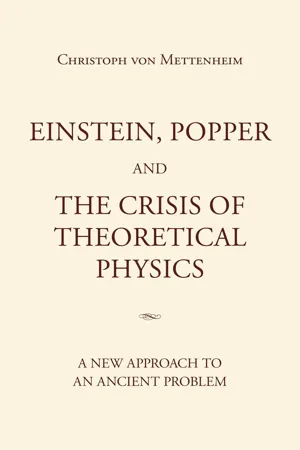
Einstein, Popper and the Crisis of theoretical Physics
A new Approach to an Ancient Problem
- 360 pages
- English
- ePUB (mobile friendly)
- Available on iOS & Android
Einstein, Popper and the Crisis of theoretical Physics
A new Approach to an Ancient Problem
About This Book
EINSTEIN, POPPER AND THE THEORY OF LIGHT AND MATTER discusses under philosophical, logical and mathematical aspects the theory of light and the problem of explaining gravitation, one of the oldest problems of philosophy and physics.Assuming the cause of gravity to lie in a force of attraction without a material agent would violate fundamental principles of physics. Newton saw that, and he knew that his theory left gravity well described but unexplained. Michael Faraday also saw the problem but could not solve it. Both relied on the ether hypothesis, which was given up at the beginning of the 20th Century in favour of Quantum Theory and the Theory of Relativity.Quantum Theory and the Theory of Relativity, however, rested on serious logical and mathematical mistakes. Max Planck gave no reasons for the individibility of the quantum, and his quantum jump assumed velocity without taking time. Einstein based his theory on a mathematical self-contradiction that remained undiscovered in a whole century. Both theories must be abandoned.In that difficult situation applying Karl Popper´s theory of science leads to a revival of the ether hypothesis in a different shape. If matter is not distinct from ether but is itself a process composed of ether particles, then their elasticity will explain the phenomena of light, of gravity, of the stability of matter, of the vortex shape of galaxies, and several other phenomena as well.
Frequently asked questions
Information
A CAUTIOUSLY OPTIMISTIC OUTLOOK
Table of contents
- Cover
- Copyright Page
- Title Page
- Table of Contents
- Introduction: The Issue at Stake
- First Part: On Einstein’s Theory of Knowledge
- Second Part: A Century Lost – The Long Return to Ether Theory
- Conclusion: A Cautiously Optimistic Outlook